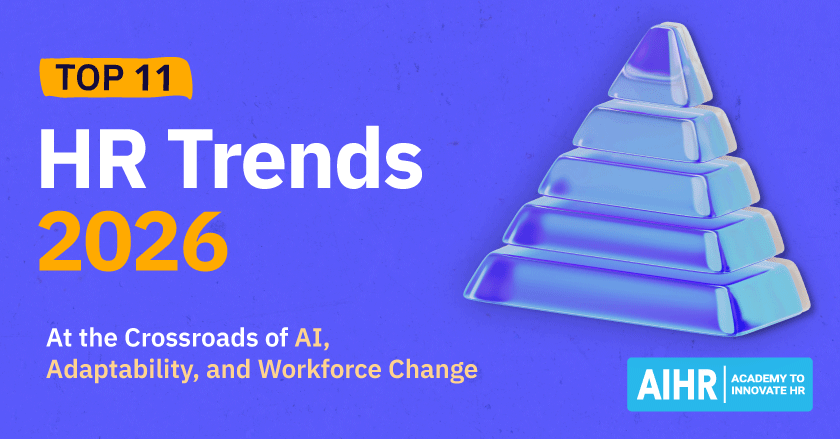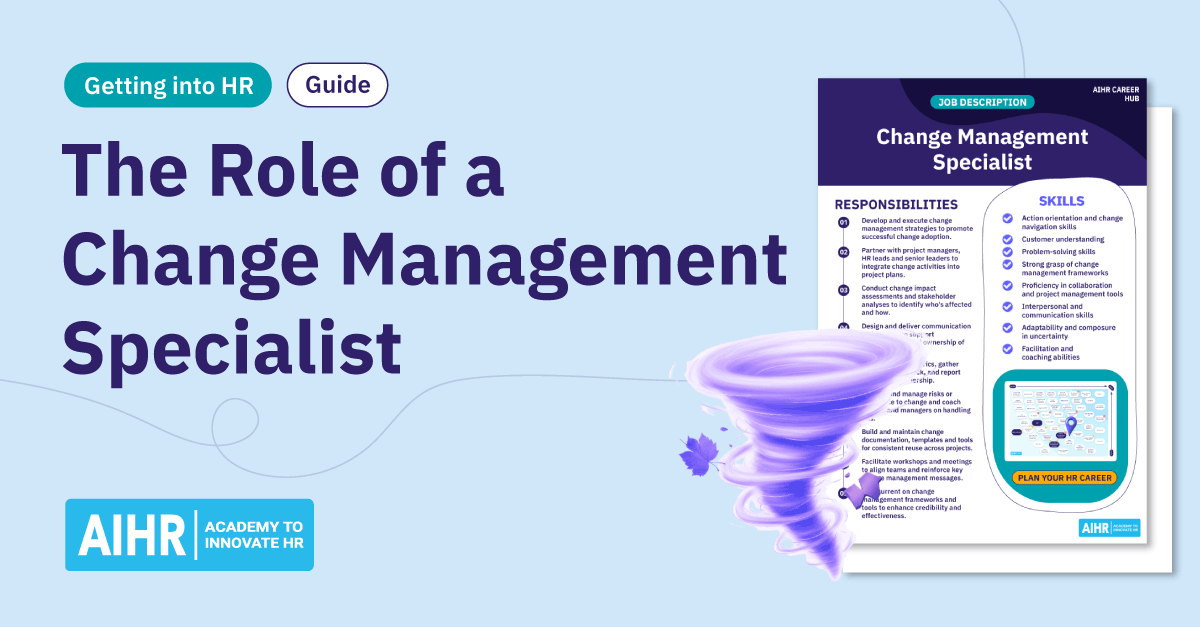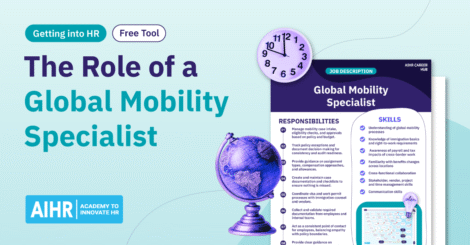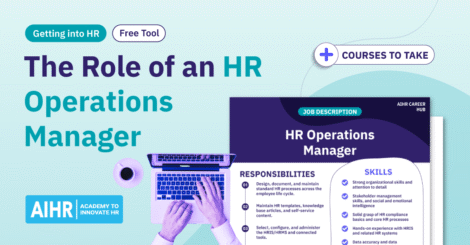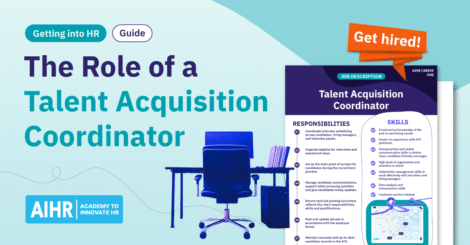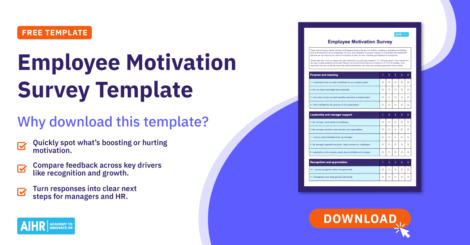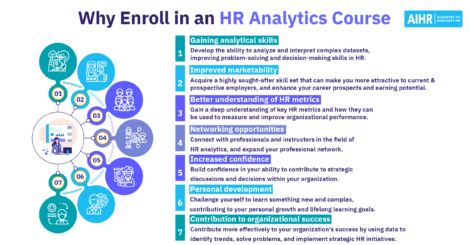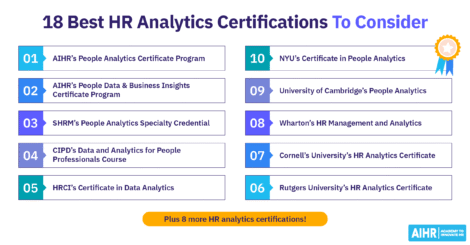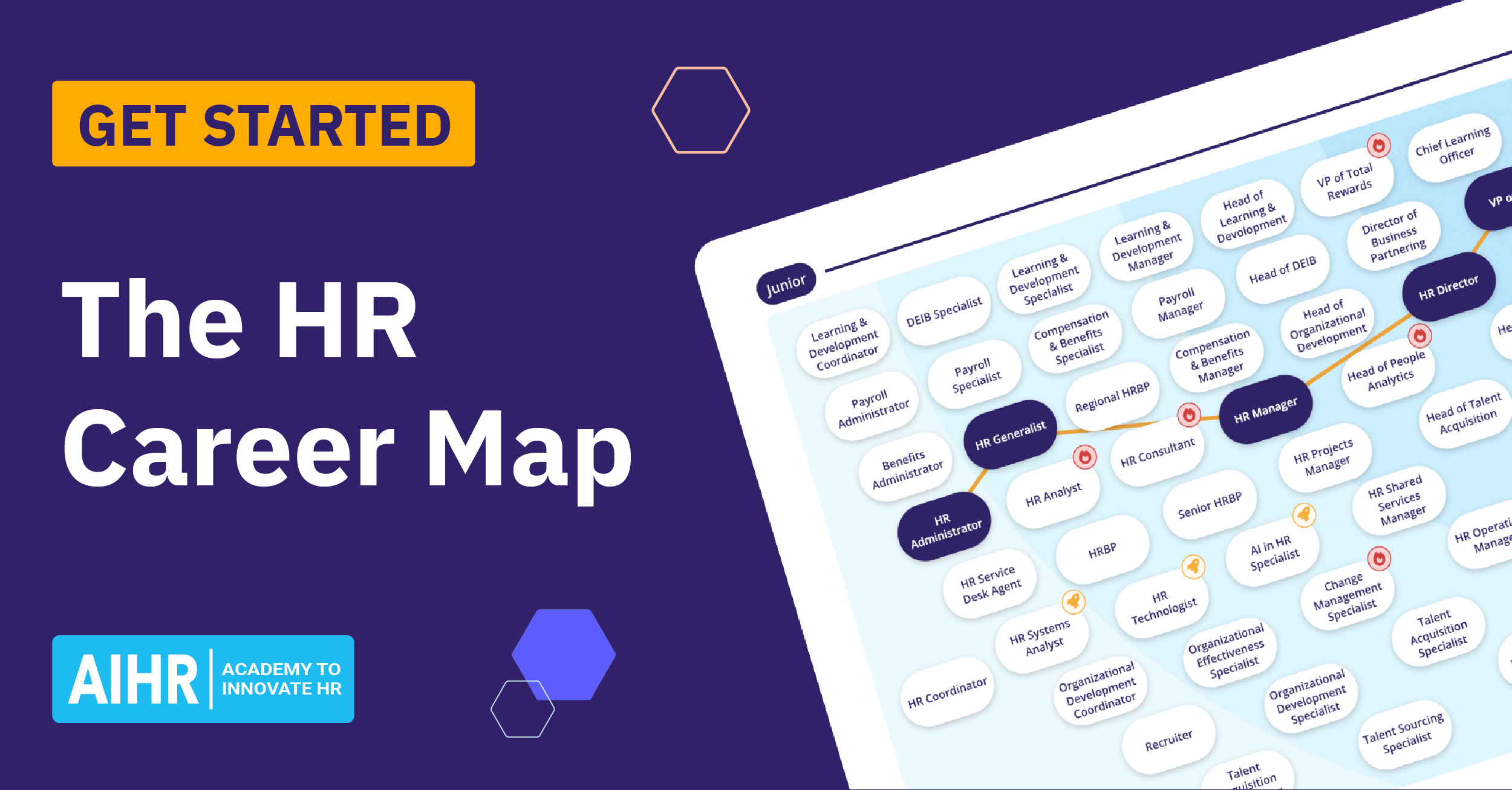Mastering different types of change management is crucial in the face of rapid business and industry changes. In fact, they can raise a project’s chances of success from 25% to 85%. This makes the role of the Change Management Specialist critical for HR teams to help drive successful business transformations.
This article dives into what a Change Management Specialist does, why the role matters, what skills and qualifications you’d need to become one, and how you can build a career in this field.
Contents
What is a Change Management Specialist?
Change Management Specialist job description
Roles and responsibilities of a Change Management Specialist
Qualifications for a Change Management role
Skills and competencies for a Change Management Specialist role
Average Change Management Specialist salary
Career path for a Change Management Specialist
AIHR certificate programs to consider
Key takeaways
- A Change Management Specialist bridges business goals and employee adoption during change initiatives.
- The role blends strategic alignment and implementation, such as communications, training, stakeholder readiness, and risk and resistance management.
- To succeed in this role, you must emphasize the human side of change, track adoption metrics and support development via targeted certifications.
- Key qualifications include a relevant degree, experience in change/OD/HR, and certifications such as AIHR’s Digital Change Management course.
What is a Change Management Specialist?
A Change Management Specialist typically sits within the HR or organizational development (OD) function and works closely with various project teams. Their mission is to guide the organization through transitions in ways that minimize business disruption, and manage employee sentiment.
They collaborate with leadership, HR, and project teams to align change initiatives with business goals and company culture. They also help develop and execute change management strategies, and serve as a key liaison between executives and staff, balancing business needs with the employee experience to help ensure smooth implementation.
Change Management Specialist job description
A Change Management Specialist develops strategies for smooth organizational change. They assess readiness and risks, design communications and training, coach managers, and track progress and impact for leaders and project teams. They also document lessons learned and maintain best practices while staying current on change frameworks, tools and methods.
Roles and responsibilities of a Change Management Specialist
Here are the roles and responsibilities of a Change Management Specialist:
- Develop and execute change management strategies and plans that promote successful change adoption (processes, systems and structure).
- Partner with project managers, HR leads and senior leaders to integrate change activities into overall project plans.
- Conduct change impact assessments and stakeholder analyses to identify who’s affected and how, and anticipate challenges.
- Design and deliver communications, engagement and training initiatives to support understanding, commitment, and change ownership.
- Track adoption metrics, gather employee feedback, and report progress to leadership to inform plan changes and improve outcomes.
- Identify and manage risks and resistance to change, and coach leaders and managers on how to approach pushback or disengaged employees.
- Build and maintain a change management plan template and documentation for consistent reuse across projects.
- Facilitate workshops and meetings to align teams and reinforce key messages.
- Support continuous improvement by capturing lessons learned for future reference.
- Stay current on HR change management frameworks, methodologies and tools to enhance credibility and effectiveness.
HR tip
If you’re currently in a different HR role and want to transition into a Change Management Specialist position, attach yourself to one live change (e.g., HRIS tweak or policy rollout) and volunteer to run three essentials, like a stakeholder map, a simple comms plan and 30-60-90-day adoption metrics. From here, you can produce a one-page impact assessment, manager briefing kit, and 30-60-90 day adoption tracker. This will help prove your capability and readiness for the role.
Qualifications for a Change Management Specialist role
To succeed as a Change Management Specialist, candidates need the right mix of education, certifications, and experience.
Educational requirements
Here are the minimum educational requirements for becoming a Change Management Specialist in the U.S.:
- Bachelor’s degree in business administration, human resources, organizational psychology or a related field. Equivalent experience in managing change initiatives may be a suitable alternative in some cases.
- Advanced degrees (e.g., Master’s in organizational development, leadership, business management) are beneficial for larger or more complex environments.
Recommended certifications
Although optional, relevant certifications within the Change Management Specialist field can help advance your career. Here are some popular certifications:
- Digital HR 2.0 Certificate Program: This certificate program empowers Change Management Specialists to lead digital transformation, manage stakeholder communication, and foster a digital mindset for sustainable change.
- HR Manager Certificate Program: This certification develops strategic leadership and people management skills, enabling Change Management Specialists to lead successful transformation projects.
- Organizational Development Certificate Program: This program equips Change Management Specialists with tools and frameworks to optimize organizational structures for effective transformation initiatives.
- Certified Change Management Professional (CCMP): The CCMP program validates Change Management Specialists’ expertise against the ACMP Standard for Change Management, providing them with a globally recognized credential.
Work experience
While organizations and industries vary, here’s the experience you will generally need to be considered for a Change Management Specialist job:
- Typically three to five years of experience in project management, HR or OD, with a focus on change management initiatives
- Experience designing and implementing change strategies, communications, and training programs
- Background in stakeholder engagement, performance improvement or transformation projects is highly preferred.
Master change management to drive successful transformations
Effective change management supports adoption, engagement and long-term business success. With AIHR’s Organizational Development Certificate Program, you’ll learn to align strategy, culture and structure for lasting results.
✅ Strengthen collaboration across teams, and lead successful culture change initiatives
✅ Develop advanced OD skills that prepare you to guide growth and transformation
✅ Learn to communicate effectively to drive meaningful organizational change
Skills and competencies for a Change Management Specialist role
Let’s explore the change management skills and competencies required of this role.
Role-specific skills
- Change navigation skills to help individuals and teams move through transitions smoothly and successfully.
- Customer/stakeholder understanding to help anticipate the needs and expectations of both internal and external stakeholders.
- Problem-solving abilities to identify challenges early, analyze root causes, and develop practical solutions to keep projects on track.
Technical skills
- Strong grasp of established change management models (e.g., Prosci ADKAR, Kotter) and their real-world applications
- Experience in designing communication and training materials to support change adoption and sustainment
- Proficiency in collaboration and project management tools (e.g., stakeholder matrices or a change readiness assessment template) for milestone-tracking, stakeholder input, and adoption metrics
- Ability to measure adoption and usage, gather feedback, and pivot strategy when necessary.
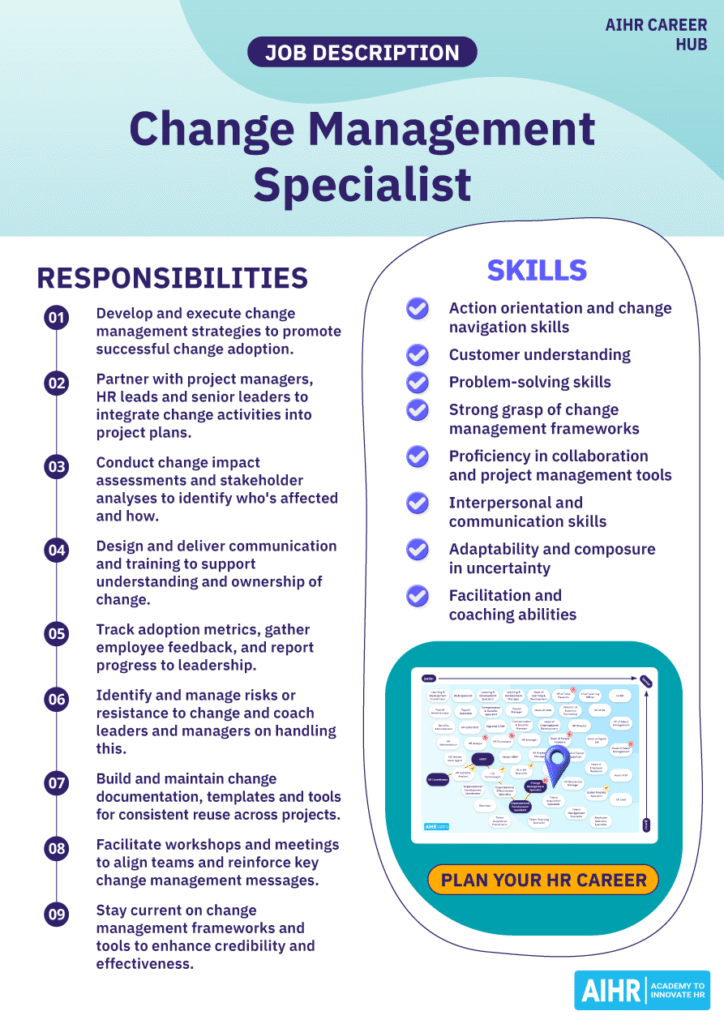
Soft skills
- Interpersonal skills to build trust and rapport, and minimize change resistance across all organizational levels
- Collaboration skills to work alongside leaders, project teams, and HR to align messaging and reinforce commitment to change
- Adaptability and composure to guide others through change calmly and confidently
- Facilitation and coaching skills to conduct workshops, discussions, and coaching sessions to strengthen awareness and buy-in across teams
- Ability to influence without authority to convince change champions, managers and sponsors who don’t report to the Change Management Specialist.
HR tip
Network with intent and secure not just a mentor but a sponsor. Find a project leader who can vouch for you, and offer clear help (e.g., “I’ll handle comms and manager briefings for your next rollout if you list me as change lead”). Set up 20-minute chats with change leads to learn what they look for, join or start a small champion group to practice, and prepare three short success stories — with numbers — to use in interviews.
Average Change Management Specialist salary
Salaries for a Change Management Specialist role vary depending on experience, the company’s size and location, and the specific job requirements and level of responsibility. For instance, a Change Management Specialist with three years’ experience in the position will likely earn less than one with 10 years’ experience.
According to AIHR’s HR Career Map, the Change Management Specialist role is a mid-career position with an estimated salary range of $133,000 to $204,000 per year. These figures are based on real-time labor market data and intelligence provided by Revelio Labs.
Career path for a Change Management Specialist
This career path may begin with an entry-level HR Coordinator role, working under supervision to support major HR functions, programs and change initiatives. From there, they can become a Change Management Specialist and take ownership of the full change plan for enterprise initiatives while coaching managers, collaborating across functions, and measuring adoption.
After gaining enough experience, they can become an HR Projects Manager, where they’ll broaden their cope from single initiatives to multi-team delivery, budgets and governance. Eventually, they can even become Head of Organizational Development, who will set the change strategy, build capability across the business, and sponsor major transformations.
AIHR certificate programs to consider
AIHR offers three self-paced online programs to help Change Management Specialists strengthen crucial skills for their role:
Digital HR 2.0 Certificate Program
The Digital HR 2.0 Certificate Program empowers you to lead digital transformation by teaching the knowledge and skills to select and implement digital tools and manage the human side of digital change. The program enables you to overcome barriers to technology adoption, drive operational efficiency, and create a culture of continuous digital innovation.
HR Manager Certificate Program
The HR Manager Certificate Program helps develop the strategic leadership, consulting and people management skills necessary for Change Management Specialists to align HR practices with organizational change goals. You’ll learn to anticipate trends, spot opportunities for innovation, and lead teams through complex transformation projects.
Organizational Development Certificate Program
The Organizational Development Certificate Program will give you a comprehensive understanding of the five-step OD process, practical frameworks, and actionable insights to drive adaptability. You’ll learn to assess organizational maturity, implement continuous improvement, and optimize structures and processes to support transformational change.
Next steps
To be an impactful Change Management Specialist, start by assessing your current skills (e.g., communication, stakeholder engagement, training design) and note your strong and weak areas. Next, close the gaps with a focused program, such as AIHR’s Organizational Development certification.
To accelerate your growth and credibility, set up a mentorship or join a peer network with experienced change management professionals to learn from real projects. Finally, define clear success metrics for your next change initiative and build a plan that includes adoption tracking and a tight feedback loop, so you can adjust in real time.


